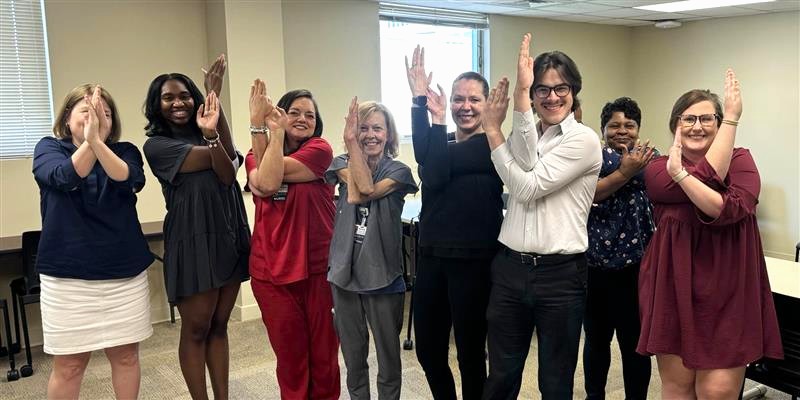 |
| Program coordinators gather for a Match Madness potluck. |
Department of Internal Medicine program coordinators Brant Weindorf and Kimberly Eardley, C-TAGME, recognized the need to improve community, morale and work-life balance. They say the changes have been nothing short of transformative.
Wellness is a core Accreditation Council for Graduate Medical Education (ACGME) requirement and is emphasized as a priority for residents and fellows. But the program coordinators felt little attention was being paid to their wellness concerns.
 |
| PCAW members take a trip to the farmers market. |
At the time, one coordinator summed up what was missing: “We need more communication and social connections with other coordinators.”
Weindorf and Eardley planned six events throughout the year, intentionally scheduling them during the less stressful months of the academic calendar. Social activities included two after-hours dinners, two workplace potlucks, a yoga session, and a group field trip to the farmers market.
All low-cost events utilized existing institutional resources and required minimal funding. The response was overwhelmingly positive. Food-centered gatherings had the highest participation, with the yoga session following closely behind.
The success of PCAW isn’t just anecdotal — it is measurable. A follow-up survey conducted in early 2025 among USA Health graduate medical education coordinators showed marked improvement across all indicators:
- Job satisfaction increased by 18%.
- Looking forward to work jumped from 43.8% to 75%.
- Feelings of isolation dropped from 50% to 37.5%.
- Overall well-being rose from 50% to 87.5%.
Notably, 100% of respondents reported that PCAW improved their sense of community, well-being, and work-life balance. One participant said it best: “[PCAW] really creates a sense of belonging for me.”
“When program coordinators thrive, so do the residents, fellows, and programs they support,” Weindorf said. “PCAW is a reminder that intentional, inclusive wellness strategies — no matter how simple — can dramatically reshape the culture of support in medical education.”
 |
| Program coordinators participate in a yoga session. |
